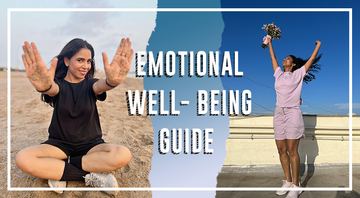In the hustle and bustle of our daily lives, it's easy to overlook the profound impact emotional well-being can have on our overall quality of life. In this blog, we will delve into the concept of emotional well-being, exploring what it means and how it can lead to more enriching relationships and a truly fulfilling life.
Understanding Emotional Well-Being -
Emotional well-being isn't just about experiencing happiness and avoiding sadness. It's a holistic approach that involves comprehending and effectively managing our emotions. It's about fostering a deep connection with our feelings, expressing them in constructive ways, and developing strategies to navigate challenging emotions. In essence, it's the art of mastering our emotional landscape.
The Power of Emotional Intelligence -
One of the key tools in the pursuit of emotional well-being is emotional intelligence (EI). EI encompasses various facets, including self-awareness, self-regulation, empathy, and interpersonal skills. By honing these skills, you can unlock the door to healthier relationships and a more fulfilling life.
Self-Awareness: Understanding your own emotions is the first step towards emotional well-being. It's about recognizing how you feel, why you feel that way, and the impact these emotions have on your thoughts and actions. Self-awareness is the foundation upon which emotional intelligence is built.
Self-Regulation: Once you've identified your emotions, the next step is self-regulation. This involves managing your emotional responses in a way that is healthy and productive. It's the ability to control impulsive reactions and instead respond thoughtfully to situations.
Empathy: Empathy is the bridge that connects you with others on an emotional level. It's the capacity to understand and share the feelings of others. By cultivating empathy, you can deepen your relationships, foster understanding, and offer support to those around you.
Interpersonal Skills: Effective communication and interpersonal skills are crucial for emotional well-being. These skills enable you to express your emotions clearly, listen actively, and navigate conflicts in a constructive manner.

Balancing Your Emotional Life -
Emotional well-being also entails achieving equilibrium in your emotional world. While it's natural to experience a wide range of emotions, it's important not to get trapped in negativity. Here are some techniques that can help you maintain a positive outlook:
Journaling: Keeping a journal allows you to process your emotions, gain insights into your thought patterns, and track your emotional journey. It's a valuable tool for self-reflection and growth.
Meditation: Meditation is a powerful practice for calming the mind, reducing stress, and enhancing emotional resilience. Regular meditation can help you become more attuned to your emotions and better equipped to manage them.
Therapy: Seeking therapy when needed is a proactive step towards emotional well-being. A trained therapist can provide guidance, support, and strategies for coping with challenging emotions and life's ups and downs.
In conclusion, emotional well-being is a cornerstone of a fulfilling and balanced life. Just as we invest in our physical health, it's equally important to prioritize our emotional health. By understanding and managing our emotions through the lens of emotional intelligence, and by using techniques like journaling, meditation, and therapy to maintain emotional equilibrium, we can truly embrace emotional well-being. It's an investment that pays off not only in the present but also for the years to come. So, take that first step today, and embark on a journey towards a more enriching and fulfilling life—one that is deeply attuned to your emotional well-being.




















